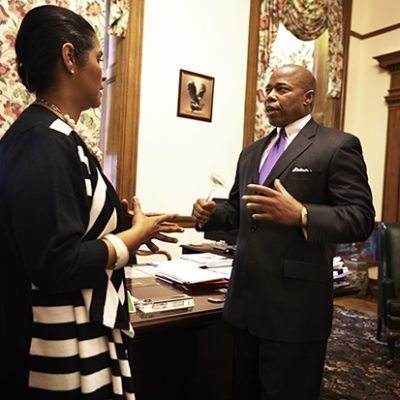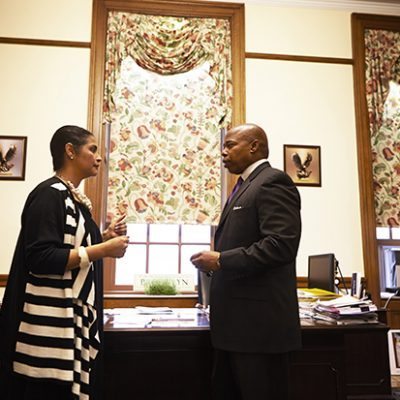
The new borough president is, as he sees it, “just a regular guy, trying to make a difference”
by Jessica Jones-Gorman • Photos By Jon Gordon
Born and raised in Brownsville—his father a butcher, his mother a house cleaner and cook—Eric Adams has a classic Brooklyn story. He was the fourth of six children, and a product of the New York City public school system who worked his way up to the rank of captain in the NYPD before making a successful run for the New York State Senate. His current role as Borough President simply underscores these decades of local passion.
“Throughout my entire life I have realized that you can’t complain about it, you have to be about it,” Adams noted recently during a phone interview from his office in Borough Hall. “I wasn’t happy with the way police treated civilians, so I joined the force to change that. And after 22 years as a police officer, witnessing the by-products of failed political policies, I ran for Senate to make a difference there, too. And that’s the same energy I bring to my role as Borough President.”
Adams, who received a degree in Data Processing from New York City Technical College and a degree in Criminal Justice from John Jay College before receiving his Masters in Public Administration from Marist College, worked in the mailroom of an accounting firm, as a mechanic, and as a clerk in the Kings County District Attorney’s Office to pay his way through school.
He pursued a career in law enforcement— a decision motivated in part by being beaten by police officers at the age of fifteen.
“I truly enjoyed that career,” Adams said of his time in the 94th and 88th precincts. “There are very few occupations where you really have an up-close and-personal, on-the-ground experience. Every day I was out there helping people, making a difference. Things that people read about on the front page of newspapers, I was experiencing firsthand. After September 11, I had that dust on my police uniform every night. I was engaged and present in that moment and in every moment during my career as an officer—all of those experiences made me the person I am today.”
In 1995, Adams co-founded 100 Blacks in Law Enforcement Who Care, an advocacy group for African American police officers. In this position, he often spoke out against police brutality and racial profiling, unafraid to challenge One Police Plaza and City Hall in the process. It was this leadership role that partly inspired his run for Senate.
“I was still active in the department as a captain when I announced my run,” Adams noted. “I felt it would be a good opportunity to make the changes that I thought needed to be made.”
So, Adams retired from the NYPD in 2006 and became a four-term representative of the 20th State Senatorial District, covering Borough Park, Crown Heights, Flatbush, Park Slope, Prospect Heights, Sunset Park, and Windsor Terrace. Affordable housing, educational funding, and preventative healthcare became his main platforms.
“I’m very proud of what we did in our district,” Adams said. “We helped engage people on how they could empower themselves in terms of housing and education. We were a very hands-on Senatorial office, and because of that I think we accomplished some great things for the people of Brooklyn.”
Adams also became a champion on statewide matters, such as good government, workers’ rights, quality of life concerns, and public safety. He effectively organized support against the NYPD’s controversial stop, question, and frisk policy and on behalf of gun control. In his district, Adams also became known for initiatives like his “Stop the Sag” campaign, which spoke out against youth wearing low-hanging pants, as well as efforts to tackle child abuse, conflict resolution, parental empowerment, and protecting small businesses.
In 2013 he decided to further all those initiatives with a bid for Borough President.
“Brooklyn was and is growing and expanding,” Adams said. “My predecessor [Marty Markowitz] did a great job of putting the borough on the map, but I knew I had a responsibility to make sure that the people who were born and raised here could use that map to find a home, a job, and a quality lifestyle.”
Adams felt his life as an average citizen and lifelong borough resident would help him remain in touch with the constituents he served.
“I’m not a career politician,” he said. “I’m just a very honest and authentic person and I think my concern for people has helped me have a very real relationship with the people of this city.”
And it’s the strides his office has gained for the people of Brooklyn of which Adams is most proud.
“I’m not a brick and mortar Borough President; I don’t want my legacy to be about all of the buildings that were built during my time in office. Instead, I want to help bu ild people, because in this borough, people are really hurting, and that needs to be changed.”
According to Adams, 25 percent of residents currently live in poverty and double digit unemployment prevails in many of the borough’s communities.
“There are a vast amount of people who want to live a better life, but are unable to do so,” he said. “So the question I struggle with daily is how do I help the people of this borough build that better lifestyle that they so desperately want and need?”
That’s why Adams has created a series of financial literacy programs throughout the borough, offering advice for residents on how to buy a home, pay for college, and retire. He’s also helped to lead the conversation around technology in the classroom as well as engaging the senior community in discussions about technological resources available in their golden years. He’s also dealt with public safety issues during what has been a turbulent period for the region.
“I am extremely proud of how aggressive we’ve been,” Adams said.
Maintaining residences in Bedford-Stuyvesant and Prospect Heights, where he has resided for over 20 years, Adams enjoys riding the borough’s streets on his bicycle, meditating, and exploring new cultures and places. He sees Brooklyn’s future as bright and full of restless change.
“In five to ten years, Brooklyn won’t look like what we’re used to,” he said. “There will be more hotels, the borough will become a tourist attraction for visitors…and Brooklyn will be the first stop.”
That’s because the borough is where both creativity and diversity thrive, Adams noted. (Kings and Queens counties are currently the most ethnically diverse in the nation).
“It’s the evolution and the history of this borough that I believe many people really appreciate,” he concluded. “Brooklyn has never stopped evolving and going forward; that evolution and diversity is only going to continue to flourish.”





